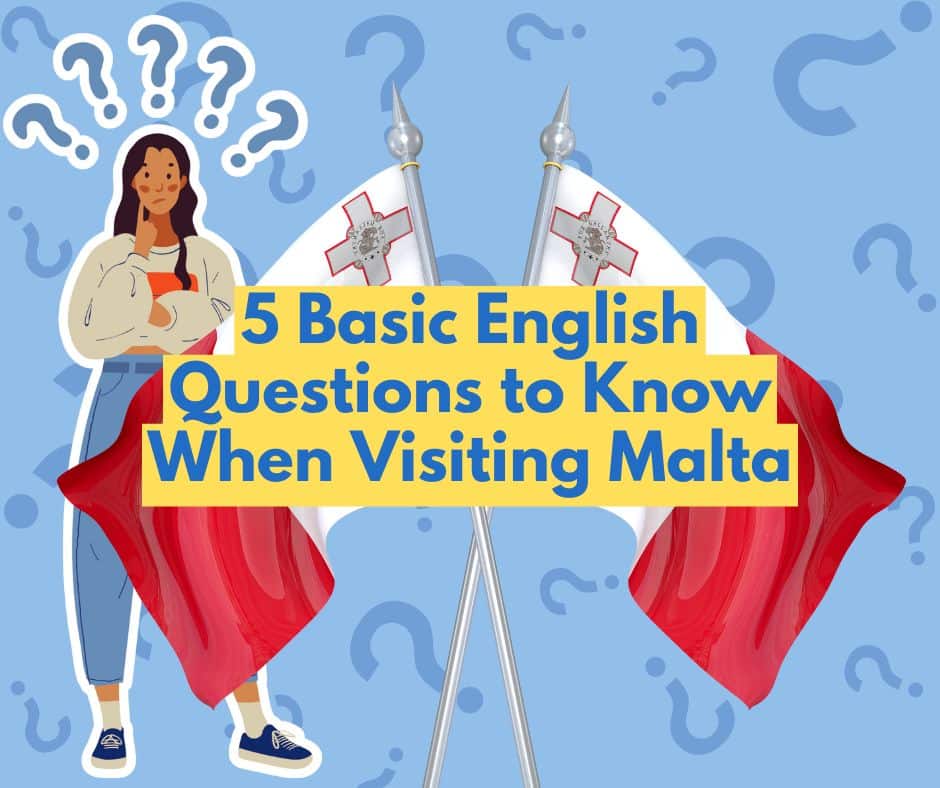

As a student in Malta, learning a few key questions in English will make your daily life much easier. You might find it challenging at first, but don’t be afraid to try speaking! Locals are friendly and appreciate any effort to communicate. The more you practise, the easier it will get, and soon, you’ll feel more confident navigating your way around! While English is one of Malta’s official languages, learning a few Maltese words can also help you connect with locals.
1. “How do I get to [place]?”
Whether you are heading to the famous Blue Lagoon or exploring the capital city of Valletta, asking for directions is an essential skill. While many locals speak English fluently, they will appreciate your effort to understand their Maltese roots.
Example:
“How do I get to the Blue Lagoon?”
“How do I get to the Upper Barrakka Gardens?”
Maltese words to know: Il-biljett (the ticket), Intlift (I’m lost)
Tal-linja in Maltese means “of the line” or “for the line”, and it’s commonly used to refer to something related to a bus line or route.
For example:
Biljetti tal-linja = Bus tickets (literally, “tickets of the line”)
L-istazzjon tal-linja = Bus station (literally, “station of the line”)
Why it’s useful: Navigating Malta’s charming streets can be tricky, especially if you are trying to reach popular spots like Marsaxlokk (famous for its fishing village and seafood markets) or The Three Cities. Knowing how to ask for directions will help you explore more confidently.
2. “Can I have the bill, please?”
As you explore, you will likely stop at a café or restaurant for a taste of local delicacies like pastizzi (savoury pastries) or Kinnie (bittersweet orange-flavoured soda). After enjoying a delicious Maltese meal, you will need to know how to ask for the bill in English. But adding a little Maltese politeness can go a long way!
Example:
“Can I have the bill, please?”
“Could I pay for my Kinnie, please?”
Maltese word to know: Il-kont (the bill)
Why it’s useful: Malta has a fantastic food scene, from street vendors selling Ħobż biż-żejt (a traditional sandwich) to fine dining in Sliema. Asking for the bill in both English and Maltese will show respect for local culture and might even earn you a smile!
3. “What time does [place] close?”
Malta’s attractions have specific hours (especially during the off-season), and to make sure you don’t miss out, it is helpful to know when things close. Whether you are visiting the Ħal Saflieni Hypogeum (a UNESCO World Heritage site) or catching a ferry to Valletta, knowing how to ask about opening times is key to planning your visit.
Example:
“What time does the National Museum of Archaeology close?”
“What time does the ferry to Valletta leave?”
Maltese words to know: L-ħin (the time), Il-vapur (the ferry)
Why it’s useful: This phrase is useful for optimising your time and avoiding arriving after hours.
4. “Can you recommend a good restaurant?”
Maltese cuisine is a delightful blend of Mediterranean flavours with a unique twist, so asking for recommendations on where to eat is a must. Whether you are in Valletta or a quieter town like Rabat, locals will be happy to suggest the best places to satisfy your taste buds.
Example:
“Can you recommend a good restaurant for dinner?”
“Where can I find the best pastizzi?”
Maltese words to know: Ristorant (restaurant), Kċina Maltija (Maltese cuisine)
Why it’s useful: Malta’s food scene is diverse, offering everything from fresh seafood in Marsaxlokk to delicious pastries in Victoria, Gozo. Asking for local restaurant suggestions not only helps you discover hidden gems but also gives you a chance to practice your English with friendly locals.
5. “How much does this cost?”
Ready to shop for souvenirs or local crafts? Whether you are bargaining at the suq (market) or buying a beautiful Luzzu (traditional Maltese boat) souvenir, knowing how to ask about prices is essential.
Example:
“How much does this Luzzu keychain cost?”
“How much is the ticket to Fort St. Elmo?”
Maltese phrase to know: Kemm tiswa’? (How much is this?)
Why it’s useful: Malta offers great shopping experiences, from local markets to unique boutiques. This phrase will help you feel more confident when purchasing goods or booking tours, plus it gives you an opportunity to practice numbers in English.
Bonus Tip: Mix English with Maltese for a Local Touch!
While English is widely spoken in Malta, using a few simple Maltese words can make your interactions more enjoyable. The Maltese people love it when visitors try their language, and it adds a special touch to your travel experience.
Useful Maltese words:
Grazzi = Thank you
Bongu = Good morning
Hawn = Here
Iva = Yes
Issa = Now
Sajf = Summer
Learning a few English phrases will go a long way in helping you feel comfortable in Malta, but don’t forget to sprinkle in some Maltese to show respect for the local culture. These five essential questions will help you navigate the island with ease and give you a chance to practice your English in real-life situations.
For more information about our services contact the inlingua Malta team on info@inlinguamalta.com












